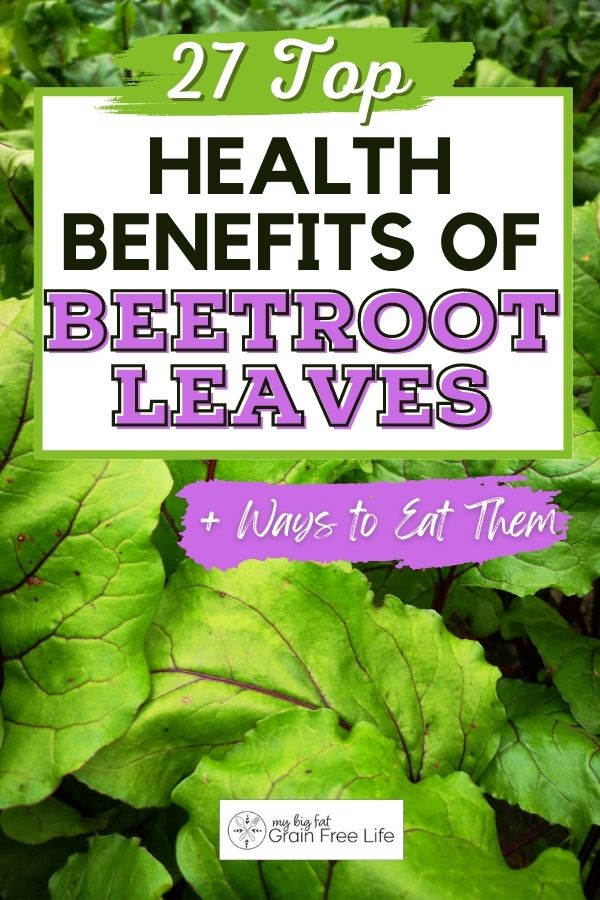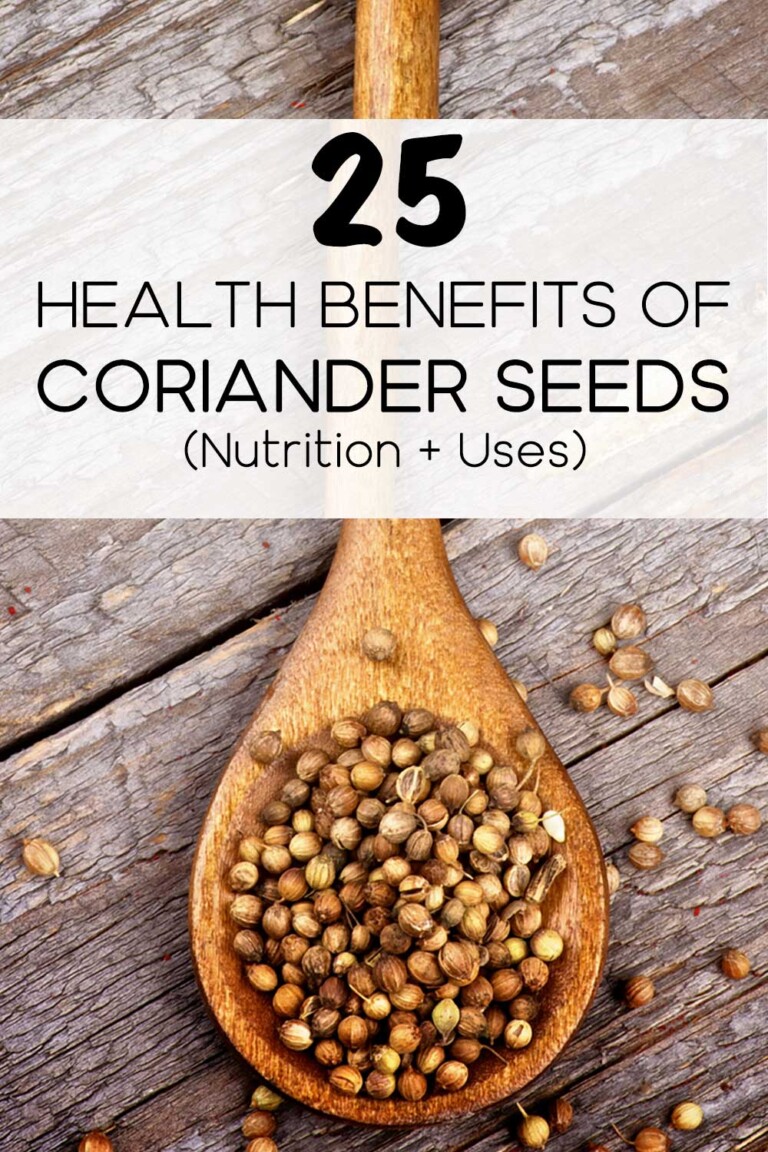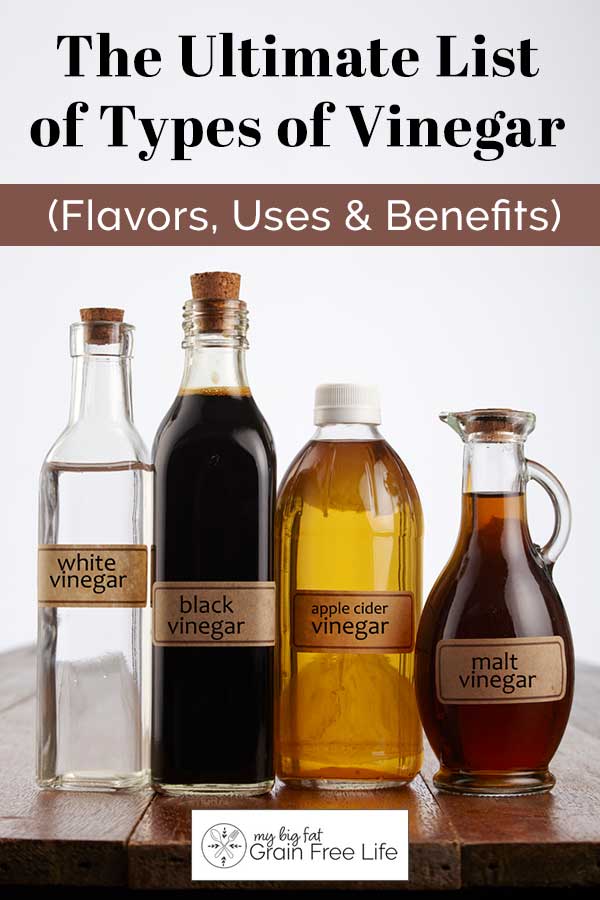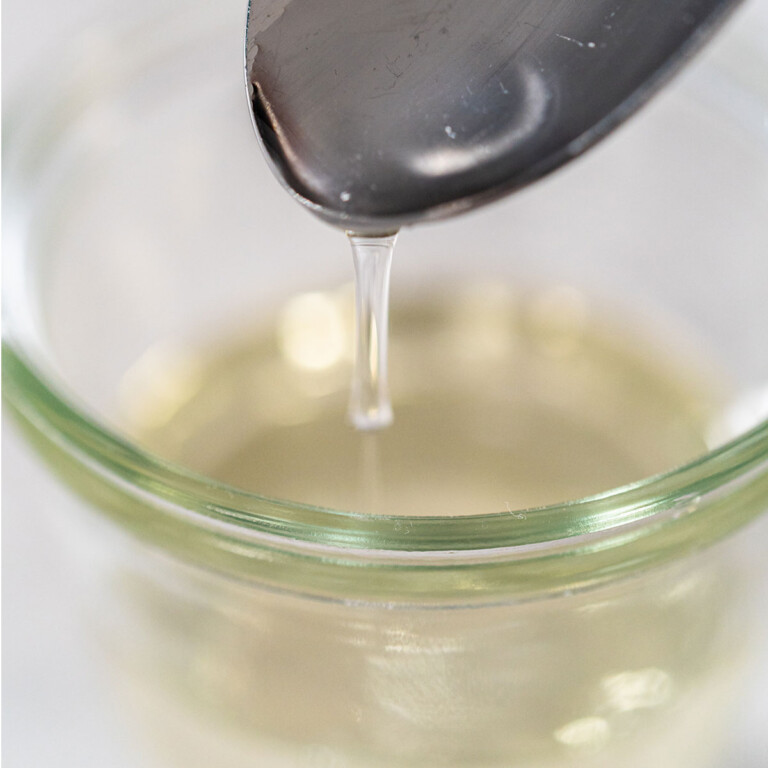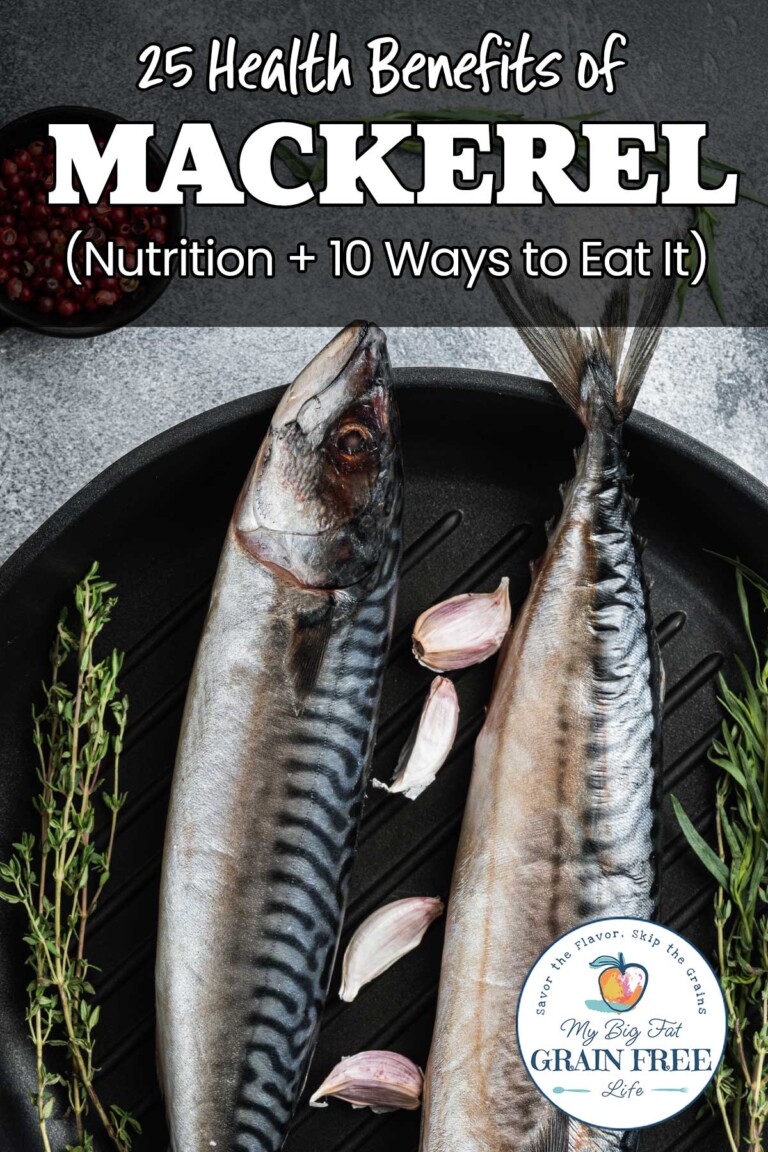27 Top Health Benefits of Beetroot Leaves + Ways to Eat Them
This post may contain affiliate links. If you make purchase after clicking a link, I may receive a commission at no extra cost to you.
Last Updated on July 31, 2023
There are so many leafy greens you can add to your diet, but often times beetroot leaves are forgotten. There are some amazing health benefits of beetroot leaves, and here’s 27 reasons you can benefit by adding them to your diet.
Health Benefits of Beetroot Leaves
If you love root vegetables like beet roots, save the leafy tops of the beetroot plant to enjoy later. These leafy green vegetables are an excellent part of a balanced diet, and there are many yummy and easy ways to serve beet greens.
Beets are a type of tuber vegetable in the family of cruciferous vegetables and have many culinary uses, separate from the leaves.
Enjoy them in a smoothie, pasta, or stew. You can even squeeze some lemon juice onto a beetroot green salad!
You can add beetroot greens along with some radish sprouts when you are making a green juice, like kale juice or spinach juice, for instance.
Beet Greens Nutrition Facts
One serving of beet greens contains nutrients like sodium, potassium, and iron. The leaves of beetroot also contain only eight calories per cup.
In addition, they are a good source of fiber and are filled with vitamins A, C, D, and K. One cup of beet greens contains 8 calories, 290 mg of potassium, 86 mg of sodium, 1.4 g of dietary fiber, 19% of the recommended amount of vitamin C, and 5% of the recommended amount of iron.
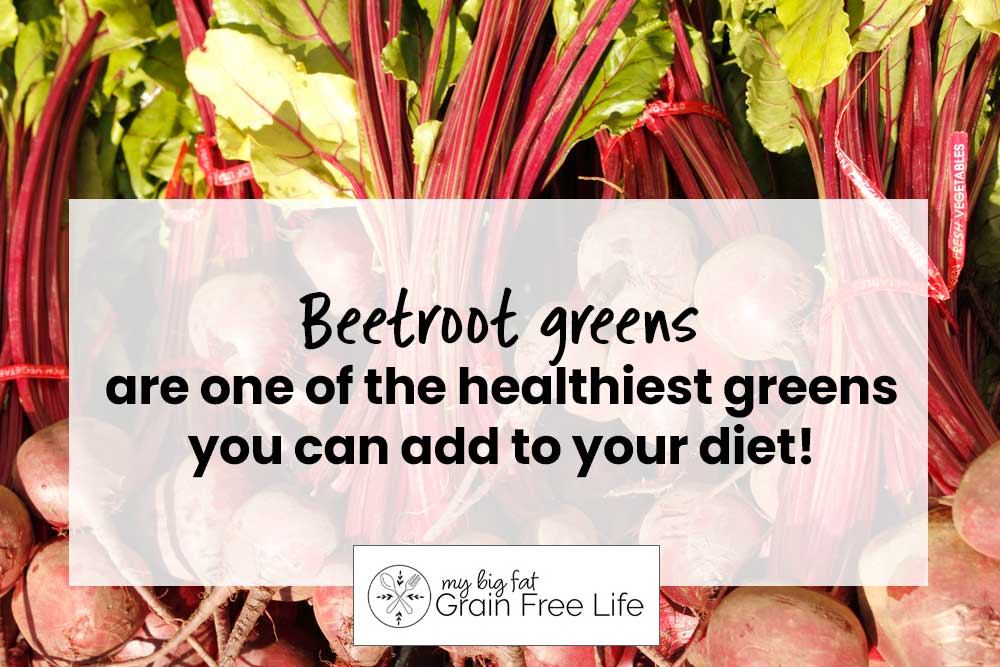
27 Health Benefits of Beetroot Leaves
Are you ready to be inspired to add some beet greens to your diet? The health benefits of beetroot leave may surprise you! Beets are one of the low-starch root vegetables loaded with vitamins, and the leaves do not dissapoint nutritionally either.
Beet greens are one of the healthiest greens you can add to your diet.
They help to increase blood flow, may help to lower blood pressure, and may help prevent liver diseases. Beet greens may also help with weight loss. They’re an excellent food if you want to add some very low calories leafy-greens to your diet.
Beetroot Leaves Are Full of Vitamins and Nutrients
Beetroot greens are full of essential nutrients like vitamins, minerals, and antioxidants. In addition, adding beetroot leaves to your diet will naturally increase your fiber intake.
This type of microgreen is a versatile food that you can enjoy in many different ways, like adding the greens to your healthy smoothies, sauteeing them, or steaming the greens.
Strong Antioxidant Properties
Fresh beet tops contain many different antioxidants like Vitamin C that help to remove the free radicals that attack your body. Oxalic acid is a natural antioxidant that is present in beetroot leaves, especially raw beet greens.
The strong antioxidant properties of beetroot greens may reduce your risk of developing cancer.
May Help Lower Blood Pressure
Leaves from the beet plant will help increase the level of nitric oxide in your body. Nitric oxide is a substance that helps blood vessels expand, which can help to lower high blood pressure. This will help to reduce your risk of heart disease.
Helps to Enhance Athletic Performance
The nitrates present in the beet plant, also known as beta vulgaris, help the muscles get more oxygen. This allows athletes to maintain performance at a higher level for a longer stretch of time than they would normally.
Improves Digestive Health
Eating leaves from fresh beets is a great way to improve your gut health. The 1.4 grams of fiber helps to maintain the growth of good bacteria. The additional fiber in your diet will help to keep your digestive system running smoothly.
Keeps Blood Sugar Controlled
There is evidence to suggest that the antioxidant alpha-lipoic acid that is present in beet greens may help to regulate blood sugar levels. They may also prevent some of the complications that arise from diabetes.
Supports Cognitive Function
Beet greens are also believed to improve brain function. Vitamin K helps to reduce the damage to neurons in the brain and might improve your mental health while slowing the progression of degenerative diseases.
Improves Mental Clarity
Eating the very low calories leafy greens gives your body many nutrients that support the brain and mental clarity. In addition, the better blood flow that comes from the nitrates in beetroot greens will provide more oxygen to your brain.
Helps Improve Mood
If you find yourself suffering from depression, consider adding beetroot greens to your diet. The green leaves contain vitamin B6 which has been shown to improve people’s moods and alleviate symptoms of depression.
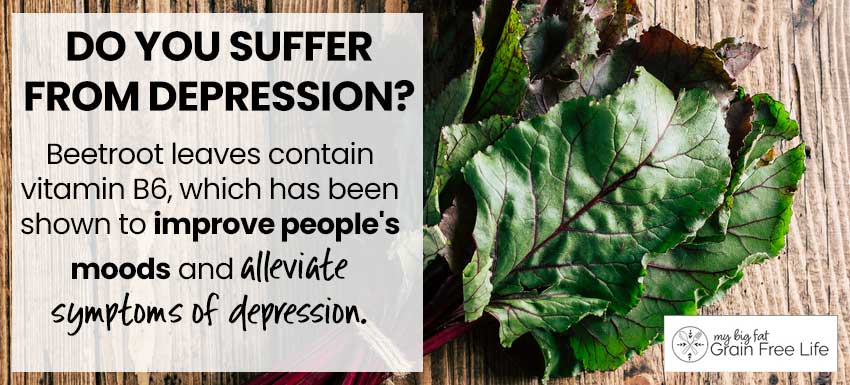
Health Benefits of Beet Greens
Beet greens are not only tasty, they are packed full of nutrients and fiber that can help support a healthy lifestyle. Keep reading for even more health benefits of beetoot leaves.
Boosts Cardiovascular Function
Beetroot also helps to prevent cardiovascular disease. The greens have high amounts of dietary nitrates in them, which increase the strength of the heart. In addition, the nitrates increase the level of nitric oxide.
The result is the blood vessels will expand to increase blood flow while also lowering your blood pressure.
Supports a Healthy Immune System
Leaves from beet plants help to improve your immune system and are a great addition to your daily diet. The leaves are high in vitamin C, which helps your body fight off cold and flu viruses.
Beetroot Leaves Help to Improve Eye Health
If you’re looking for the best way to improve your eye health, consider eating beetroot leaves. The leaves have both vitamin A and lutein, which are critical to improving the health of your eyes. Plus, these compounds reduce the risk of advanced macular degeneration.
Beetroot Leaves Contain Anti-cancer Properties
Greens from the beet plant also contain anti-cancer properties like antioxidants. These compounds may reduce the tumor cells present in the human body.
Beetroot Leaves Are Anti-inflammatory
The greens of the beet plant contain high amounts of fiber, folic acid, and antioxidants, including betalains which have anti-inflammatory properties. In short, betalains may decrease inflammation in your body.
Strengthens Bones
Beet greens contain a high amount of the magnesium, copper, and folate that your body needs. These minerals will help your bones to grow stronger.
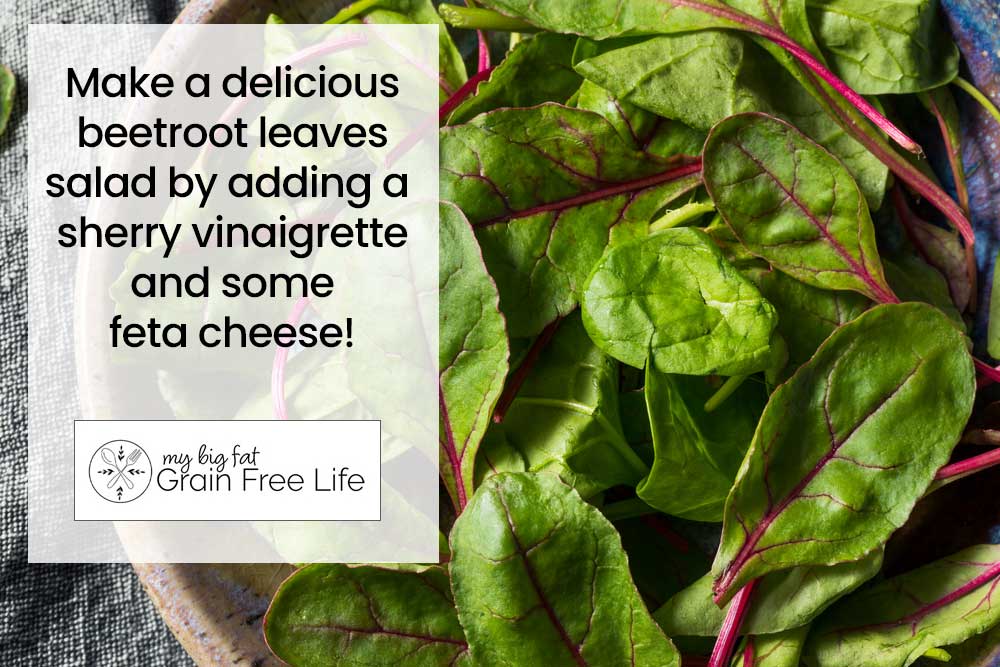
Supports Blood Health
The top greens of the beet plant are nutritious green leafy vegetables with a high amount of the important mineral iron. They actually contain more iron than spinach. Iron is needed to prevent anemia and is a critical part of hemoglobin. Hemoglobin helps to transport oxygen from the lungs throughout the body.
The greens are also full of vitamin B6, which is vital for creating the red blood cells and neurotransmitters that your body needs to remain healthy.
May Improve Skin Health
Eating macro or micro beet greens may help you have clear, glowing skin. The greens are high in vitamin C, which helps your body detoxify the liver. Plus, the antioxidant vitamin C improves the collagen production you need for healthy skin.
Beetroot Leaves Support the Digestive System
The high fiber content of beetroot leaves will help to keep your digestive system regular and help to flush toxins from your body.
The fiber content also encourages the growth the healthy bacteria throughout your digestive tract and may help to prevent inflammatory bowel disease.
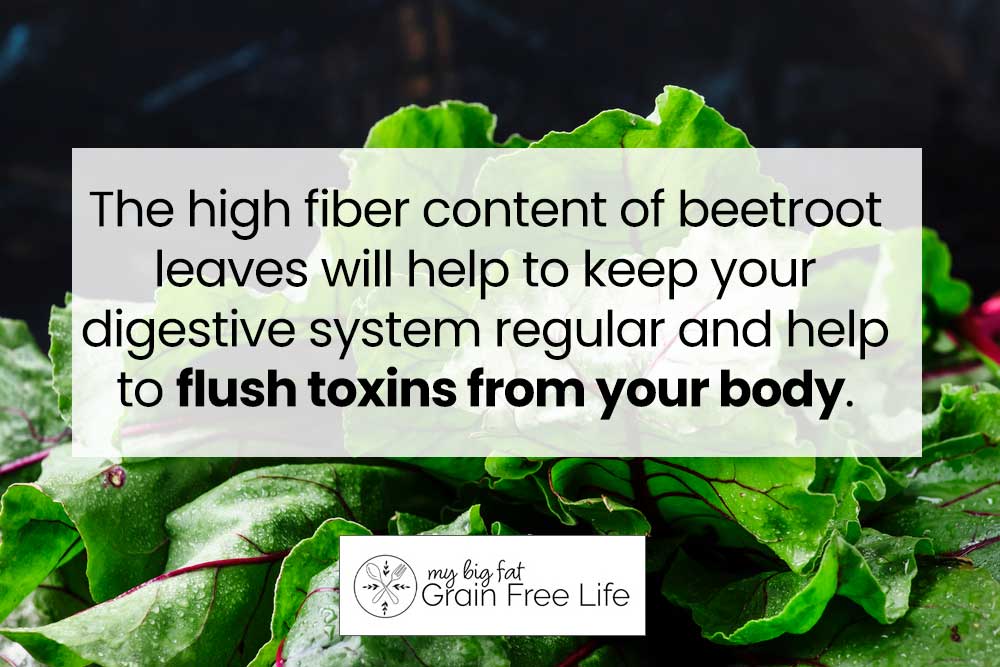
Helps to Promote Healthy Teeth
You need nutrients like calcium, magnesium, and vitamin D in order to build the strong enamel that prevents cavities. Beetroot greens are full of these nutrients, so adding the greens to your diet will help to give you healthy teeth.
Encourages a Healthy Pregnancy
Pregnant women should eat plenty of folate, which is present in beetroot greens. Folate helps to prevent neural tube defects in the baby.
Helps to Treat Alzheimer’s Disease
The high nitrates present in beetroot greens may help to improve the flow of oxygen in the human body. This includes improving the amount of oxygen reaching the different parts of the brain, which may improve symptoms of dementia in older adults.
Prevents Vitamin-a Deficiency
Eating very low calories leafy-greens from the beet plant will also help to prevent vitamin A deficiency. This is because one cup of beetroot greens contains more than 100% of the daily required vitamin A, or beta-carotene, that the human body needs.
Helps to Prevent Osteoporosis
The minerals magnesium, copper, and folate that can be found in the beet stalks and leaves help to strengthen bones.
May Help to Reduce Cholesterol
Not only will eating beetroot greens help to reduce your risk of heart disease, but it may also help to reduce the cholesterol levels in your body. This is because the folate in the greens helps to regulate cholesterol, reducing your risk of high cholesterol.
Beet Greens Are Great for Detoxification
If you are interested in detoxification, then you should add beet leaves to your diet. The greens are full of fiber and loaded with antioxidants. The fiber absorbs toxins in your digestive system while the antioxidants attach any free radicals inside your body.
Prevention of Diseases
The greens from beets may help your body produce white blood cells. These cells fight off the foreign body that causes disease.
Beetroot Leaves Help Improve Energy Levels
The healthy nitrates in the beet room help to improve blood flow, which also helps to increase your energy levels.
Beetroot Leaves
If you want to add nutritious green leafy vegetables to your diet, then beetroot leaves are an excellent choice. You can drink beetroot juice, add the leaves to a salad, or toss the greens into a stew.
What Do Beet Greens Taste Like?
The tender greens of the beet plant have a mildly sweet flavor that is similar to other leafy greens, although sweeter than kale. Beet plants at a later stage of plant growth will develop a bitter taste, though.
Ways to Eat Beetroot Leaves
There are numerous ways you can add beetroot greens to your diet. You can enjoy the leaves in juice form, eat them raw, top them with a vinaigrette, or add them to your cooking process.
For instance, you can…
- Add to a Salad
- Toss in a Smoothie
- Add to Pesto
- Add to Soups and Stews
- Toss in a Stir Fry
Did you know there are health benefits of lemon seeds? Consider crushing them and adding some to salad dressing for added nutrition.
How to Store Beetroot Leaves
Store beetroot greens by washing the leaves to remove any grit or dirt on the leaves. Then make sure the greens are completely dry. Wrap the leaves in a paper towel before placing them in a perforated plastic bag. You can store the greens in the refrigerator for three to four days.
Who Should Use Caution With Beetroot Leaves
Beetroot leaves are high in potassium which has the potential to increase your risk of kidney stones. So be cautious about adding beetroot greens to your diet if you have kidney disease or kidney stones. Some people are also allergic to beetroot leaves.
FAQ About Beetroot Leaves
Keep reading to learn the answers to many commonly asked questions about beetroot leaves.
How Do You Clean Beetroot Leaves?
Clean beetroot leaves by chopping them off at the root. Then you can wash the leaves just like you would wash lettuce or kale. While the stem is edible, you may wish to remove it before chopping the leaves to your desired size.
Is It Safe to Eat Beetroot Leaves?
Yes, it is safe to eat both raw and cooked beetroot leaves. You can add them to a salad or add beet juice to a smoothie.
Are Raw Beet Leaves Good for You?
Yes, the raw beet leaves have a high nutritional value and are good for you to eat.
Are Beet Greens Healthier Raw or Cooked?
Typically beet greens are healthier to eat raw because cooking removes some of the dietary nitrates from the greens.
Are Beet Greens as Nutritious as Spinach?
Beet greens have more vitamin C and iron than spinach does. However, spinach has a higher level of protein, folate, and vitamins A, E, and K. Choose which leafy green vegetable you’d like to eat based on the nutrients you need.
Is Beet Leaf Better Than Beet Root?
The beet leaf has more protein, fiber, calcium, and vitamins A, E, and K than the root of the beet plant.
Are Beet Greens Healthier Than Kale?
Yes, beet greens are healthier than kale and one of the most nutritionally rich foods available for people to eat.
How Do You Store Fresh Beet Leaves?
Store fresh beet leaves by wrapping them in a paper towel before placing them in a perforated plastic bag. Keep them in the fridge for three or four days. Ideally, the humidity level in your refrigerator will be around 95%.
Can You Eat Beetroot Stalks?
Yes, you can eat the beetroot stalks, although they may be tougher to eat than the leaves.
Can You Juice Beet Leaves and Stems?
You can juice the beet leaves and stems. The juice is an excellent way to add the nutrients and B vitamins in beetroot greens to your diet. Here’s a recipe for detox beet green juice and one for a beet greens smoothie.
Final Summary on Beet Greens
Beet greens are a nutritious green leafy vegetable that has many health benefits. It may lower your diastolic blood pressure, help with weight loss, and boost your brain function. The sweet, slightly earthy flavor will add flavor to stews, salads, and smoothies.

